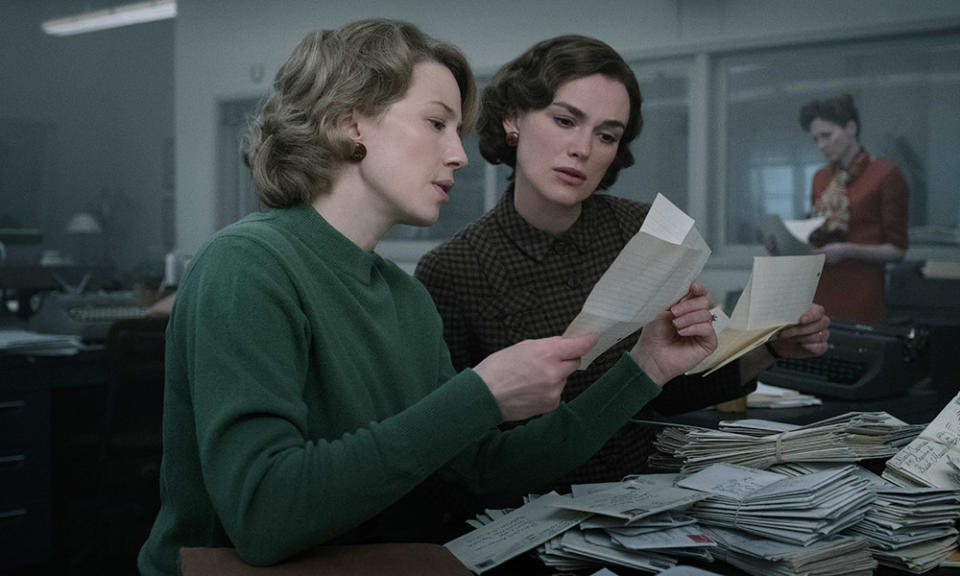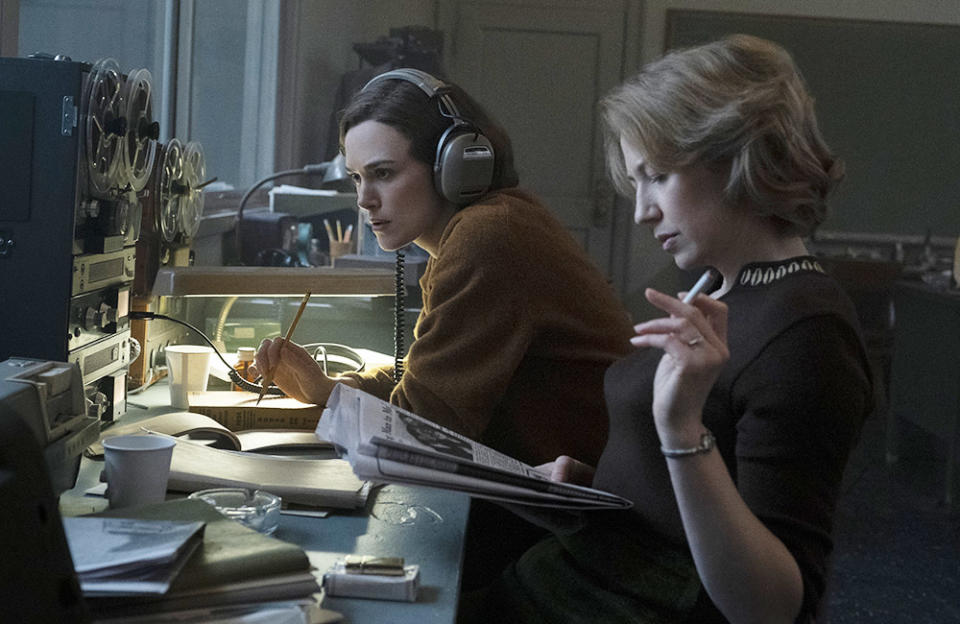‘Boston Strangler’ Stars Carrie Coon and Keira Knightley on Playing the Working Mothers Who Pursued One of America’s Most Notorious Serial Killers
- Oops!Something went wrong.Please try again later.
- Oops!Something went wrong.Please try again later.
- Oops!Something went wrong.Please try again later.

As working mothers with public-facing careers, Boston Strangler stars Carrie Coon and Keira Knightley related to their reporter characters on a rather intimate level.
With Coon and Knightley portraying Boston Record American investigative journalists Jean Cole and Loretta McLaughlin, respectively, both actors understood the familial sacrifices that their characters made in order to chronicle the 13 women who were murdered by the “Boston Stranger” in the early 1960s. Their reporting also brought great danger to them and their families, as their newspaper made a point to capitalize on their gender by uncharacteristically publishing byline and crime scene photos of them. As performers, Coon and Knightley know full well that their images are also used to help sell their work, so they certainly understood their characters’ reluctance to do the same.
More from The Hollywood Reporter
Disney+ Adds Buddy Cop Series 'Han River Police' to K-Drama Slate
'GOT,' 'Vikings' and 'Summertime' Stars Join Roland Emmerich's Gladiator Series 'Those About to Die'
For Coon, Matt Ruskin’s “Fincher-esque” thriller presented an opportunity to play a female hero in a way that actually felt female.
“I feel like television is doing more to advance stories for women, and I think film is a little bit behind, which is why it’s important to participate in films like [Boston Strangler],” Coon tells The Hollywood Reporter. “I also think that perhaps we haven’t solved the question of what the female hero story even looks like. One of our solutions has been to take the male stories that already exist and just plug women into them, as though that’s going to solve the problem, but I think that the narrative is really underexplored. We have a lot of work to do.”
Below, during a recent conversation with THR, Coon and Knightley also discuss their theories on the Boston Strangler and whether multiple parties were involved or not.
So, had the two of you crossed paths before this, or were you strangers from afar like these characters?
Keira Knightley: We were strangers, but I loved Carrie’s work. I’ve been such a fan of The Leftover. Leftover or Leftovers?
Carrie Coon: (Laughs.) Leftovers!
Knightley: Leftovers! Multiple! I thought it was one of the most amazing things ever, and I thought she was so amazing in it. So I was so unbelievably happy when she said that she’d do this. It’s always thrilling to work with people whose work you love, and so it was lovely to see her work up close and personal.
Coon: And Keira was the reason I did [Boston Strangler], aside from Matt Ruskin, our writer-director, who I really adore. He’s a deeply moral filmmaker and a feminist. Absolutely. But of course I admire Keira so much, and we have people in common. So her reputation preceded her as being incredibly gracious and well prepared and focused, and overall, she’s just a very down-to-earth and wonderful human being. So we had a great time, and we’re both working moms, so it’s hard.

Carrie, I mean this as a compliment to Matt, but the Fincher vibes are certainly present here. As someone with firsthand experience, could you feel that as well?
Coon: Definitely. I sense a bit of a Zodiac fan in Matt, but it’s the right palette for that time [in the ‘60s]. So he’s right to approach it that way. And who’s not a Fincher fan? He’s the master of his craft, and so any filmmaker should aspire to be Fincher-esque. It speaks well of Matt that he’s doing that.
Keira, did Scott Free bring you this as a follow-up to your collaboration on The Aftermath a few years ago?
Knightley: I don’t know if they brought it to me as a follow-up, but I was really glad because I loved working with them before. So it was just great to get a story of such extraordinary women, and it was a really lovely thing to work with them again.
Everyone’s process is different, but did the two of you reach out to the families of your characters?
Coon: Well, Keira can tell you that when Matt first came to her, he had a whole booklet of research that he’d already done, and I know that Matt knows Jean Cole’s daughter. Matt actually found out he had a very personal connection with the character I play and her family, and so he was able to really spend a lot of time speaking with them. Ultimately, we were able to trust Matt’s writing. We knew that Matt had dignified these women with the storytelling that he was doing, and so we were not encouraged to reach out to the families, necessarily. It was really about leaning into the script that we were given and enjoying the writing.
Knightley: Loretta’s [McLaughlin] son and grandchildren did come to the set as well, so I was really fortunate to meet them. That was great. But as Carrie said, we were unbelievably lucky with the amount of research and due diligence that Matt had done in telling this story. So we really just leaned on him, which was amazing.
Loretta (Knightley) and Jean (Coon) were pressured to take byline photos unlike the rest of the newsroom, and then they were purposefully photographed at crime scenes. And it was all in the name of selling newspapers. Given the nature of the entertainment industry, did that story point hit pretty close to home?
Knightley: Fortunately, I’ve never had to report on an actual crime, but yeah, absolutely. There was obviously an added danger to what they were being asked to do, but as far as the conversation about women in public spaces, they received death threats for reporting on this. They also would’ve received death threats had they been reporting on politics, as many women do today. So any woman in the public sphere today deals with a lot, and that was certainly happening back then as well.
Carrie, your image is also used to help sell your work, so could you relate to what they likely felt?
Coon: Oh, sure. There’s certainly an extraordinary pressure on women, not just in the public sphere that Keira and I are operating in, but on any woman. You’re sort of damned if you do and damned if you don’t. If you put too much effort into your appearance, you’re criticized. If you put no effort into your appearance, you’re criticized. And after you turn 40, you’re invisible. So I applaud television. I feel like television is doing more to advance stories for women, and I think film is a little bit behind, which is why it’s important to participate in films like [Boston Strangler]. I also think that perhaps we haven’t solved the question of what the female hero story even looks like. One of our solutions has been to take the male stories that already exist and just plug women into them, as though that’s going to solve the problem, but I think that the narrative is really underexplored. We have a lot of work to do.
Do the two of you believe the theory that multiple people operated under the guise of the Boston Strangler?
Coon: Well, I’ve heard it told from Jean and Loretta’s families that they actually did believe it was one person, that it was [Albert] DeSalvo responsible, ultimately. But when you look at the facts of the case that have been surveyed after some time, it’s quite plausible that there were multiple men involved, especially because of the killings that happened in Michigan. It seems, at least in one case, that there was an attempt to hide an affair and a pregnancy, and we know that women are murdered all over, especially in the domestic sphere. We know that that’s one of the main places where women are assaulted, especially in the United States because of the number of guns we have available to us in this country. So I think it was multiple people.
Knightley: That’s what I drew as well, knowing nothing other than what’s in the public sphere. It just seemed probable that it was multiple people.
Decades from now, when the two of you look back on this experience, what day will you remind each other of, first?
Knightley: It’ll be the day that we were doing a reporting scene, and I realized that I hadn’t done the research into how to touch type [on a typewriter]. So I looked over to Carrie as they were about to film me, and I went, “Carrie, I don’t know how to touch type. I didn’t learn how to touch type.” And she said, “No, of course, you didn’t. You have two children.” And I went, “Yes, that’s very true.”
Knightley & Coon: (Laugh.)
Coon: Years ago, we also would’ve learned shorthand to prepare.
Knightley: Yeah, touch typing and shorthand would’ve been learned, but as it was, I pretended.
Coon: Film is very good for that.

What about you, Carrie?
Coon: For Keira and I — because of the way the schedule was made, and because we had a Covid shutdown — we were thrust into doing our most intimate friendship scenes on days one and two. So there was no time to ramp up into the story, but that’s our job. Our job is to snap into some intimacy, but on a particular day, they were also doing a closeup of a cigarette. So I think I smoked three packs of American Spirits for that setup, and I felt really crazy after that.
Knightley: I was like, “Are you feeling okay?”
Coon: Well, I didn’t throw up, and I’ll always be proud of that.
***
Boston Strangler is now streaming on Hulu. This interview was edited for length and clarity.

